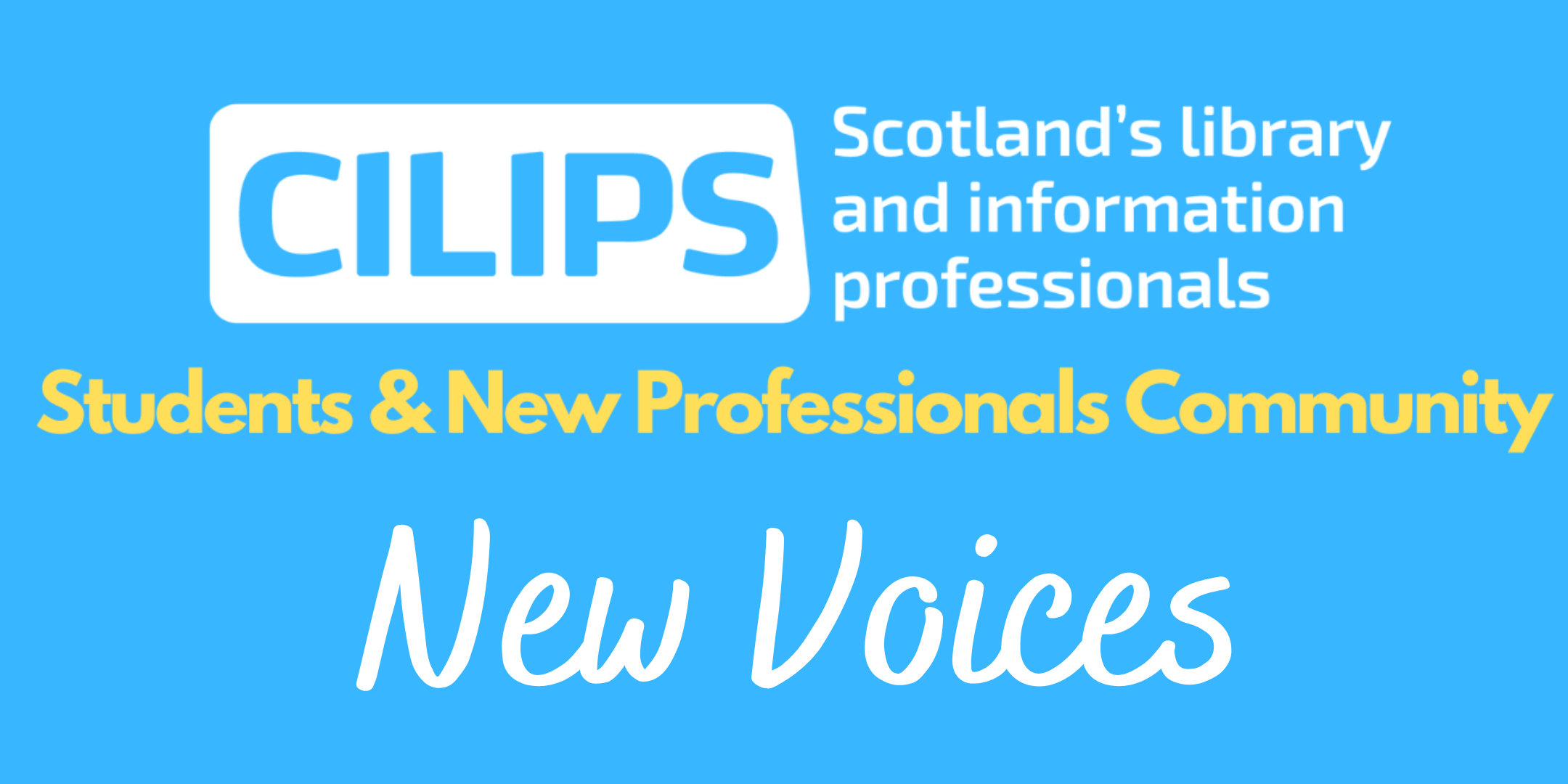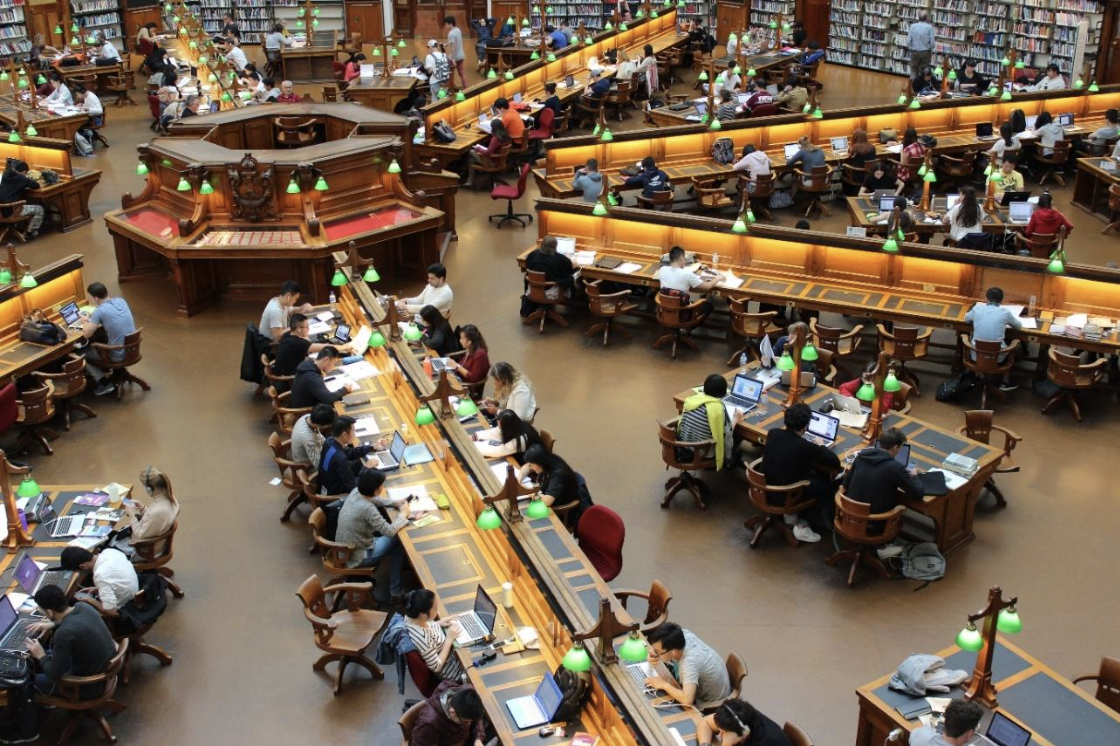New Voices RGU Student Series 2023 – Bianca Hill
Category: Blog, New Voices, New Voices, RGU Student Series

In this 2023 Student Series for the New Voices blog, the CILIPS Students & New Professionals Community will be sharing the views of Robert Gordon University students from the MSc in Information and Library Studies. With special thanks to Dr Konstantina Martzoukou, Teaching Excellence Fellow and Associate Professor, for organising these fantastic contributions. This series will be shared by CILIPS Graduate Trainee Leah Higgins.
 Today we are highlighting a contribution from RGU Student Bianca Hill. Bianca is a South African student with an academic background in English and Psychology, and is one of the Msc Course Representatives. Outside of university, Bianca enjoys listening to music, playing butler to their nine cats, and collecting second-hand books, all whilst volunteering at a local library.
Today we are highlighting a contribution from RGU Student Bianca Hill. Bianca is a South African student with an academic background in English and Psychology, and is one of the Msc Course Representatives. Outside of university, Bianca enjoys listening to music, playing butler to their nine cats, and collecting second-hand books, all whilst volunteering at a local library.
1.1 CILIP Definition of Information Literacy & The Higher Education Context
The scale and interconnectedness our global information society means that we need to ensure people are educated on information use, which is distinct from information technology (IT) use (Johnston & Webber 2003). This is where information literacy (IL) comes in.
IL is a set of skills and abilities that people need in order to undertake information-related tasks; furthermore, IL concerns the applications, competencies, and confidence needed to make the best possible use of information and interpret it judiciously (CILIP 2018).
Within the Higher Education (HE) context, IL “contributes to academic competencies” and enables students to engage in “deep learning” whereby they are able to perceive the relationships between ideas, ask novel questions, and pursue innovative lines of thought and enquiry (CILIP 2018). Studies have demonstrated that university students who undergo IL training have better academic outcomes, specifically related to information seeking behaviour, assessment grades, and skills transference, when compared to their peers who did not undertake any IL training sessions (Reed, Kinder & Farnum 2007; Kim & Shumaker 2015).
1.2 Roles & Responsibilities of Information Professionals
Today the academic librarians existence in HE institutions has been transformed from an elusive information custodian who only exists within the walls of the library to an active member of the university teaching staff who roams from lecture hall to lecture hall. The literature suggests that librarians have been put in the role of collaboration facilitator when they are not in the position to actually teach IL courses (Harden & Martinez-Montavon 2020; Inzerilla 2017). They meet with faculty and initiate partnerships to ensure IL is embedded into HE curricula. The main responsibility is therefore to provide students with assistance when needed, but also to be advocates for IL and highlight its place in HE.
1.3 Best Practices of Developing IL Skills in Universities
A number of studies have been undertaken around the world on the best methods, frameworks, and the role of the librarian in the implementation of IL courses.
There are three approaches to IL instruction (Bickford & Palmer 2019):
1. One-Shot/Workshop – Topic-specific classes hosted independent of the lecture room.
2. Embedded – Librarians and faculty collaborate on curriculum development that includes IL outcomes.
3. Credit-Bearing – Form part of the General Education requirements, along with modules such as “Introduction to Academic Writing”.
While each of these approaches each have their merits, the common elements of the best practices in teaching IL skills are the collaboration between librarian and faculty in general and in the development of learning outcomes and courses (Bickford & Palmer 2019).
1.4 The Current Challenges
Many universities throughout the world have implemented IL classes through the partnership between faculty staff and university librarians. While there is evidence that these classes are beneficial, there are still a few underlying challenges:
• Some institutions do not prioritise IL classes which leads to librarians having a very limited amount of time to actually teach students these skills (Johnston & Webber 2003).
• Many librarians are expected to teach these IL programmes without having the same training as teachers (Inzerilla 2017).
• Faculty are often reluctant to work with librarians for a multitude of reasons such as not feeling IL courses are necessary and overall faculty culture (Inzerilla 2017).
Thank you to Bianca for investigating the importance of understanding and promoting information literacy in a higher education context.
Stay tuned for more in the 2023 New Voices RGU Student Series coming soon and be sure to check out the rest of CILIPS SNPC’s New Voices blog.
1.6 Reference List
BICKFORD, C. & PALMER, M., 2019. IN, INTO, AMONG, BETWEEN: Information Literacy Skills in Transition. In: G. VEACH, ed. Teaching Information Literacy and Writing Studies: Volume 2, Upper-Level and Graduate Courses. West Lafayette, IN: Purdue University Press. Pp. 121-134.
CHARTERED INSTITUTE OF LIBRARY AND INFORMATION PROFESSIONALS (CILIP) (2018). CILIP Definition of Information Literacy 2018. [online]. London: CILIP Information Literacy Group. Available from: https://infolit.org.uk/definitions-models/ [Accessed 20 November 2022].
HARDEN, M. & MARTINEZ-MONTAVON, A. M. 2020. Faculty Workshops: Incorporating the Framework and Embedding Information Literacy in Undergraduate Courses. In H. JULIEN, M. GROSS & D. LATHAM, ed. The Information Literacy Framework: Case Studies of Successful Implementation. London: Rowman & Littlefield. pp. 22-32.
INZERILLA, T. 2017. Teaching Faculty Collaborating With Academic Librarians: Developing Partnerships to Embed Information Literacy. In S. INGVALDSEN & D. OBERG, ed. Media and Information Literacy in Higher Education: Educating the Educators. Kidlington: Chandos Publishing. pp. 67-88.
JOHNSTON, B. & WEBBER, S. 2003. Information Literacy in Higher Education: a review and case study. Studies in Higher Education, 28(3), pp. 335-352.
KIM, S. U. & SHUMAKER, D. 2015. Student, Librarian, and Instructor Perceptions of Information Literacy Instruction and Skills in a First Year Experience Program: A Case Study. The Journal of Academic Librarianship, 41(4), pp. 449-456.
REED, M., KINDER, D. & FARNUM, C. 2007. Collaboration between Librarians and Teaching Faculty to Teach Information Literacy at One Ontario University: Experiences and Outcomes. Journal of Information Literacy, 1(3), pp. 29-46.


